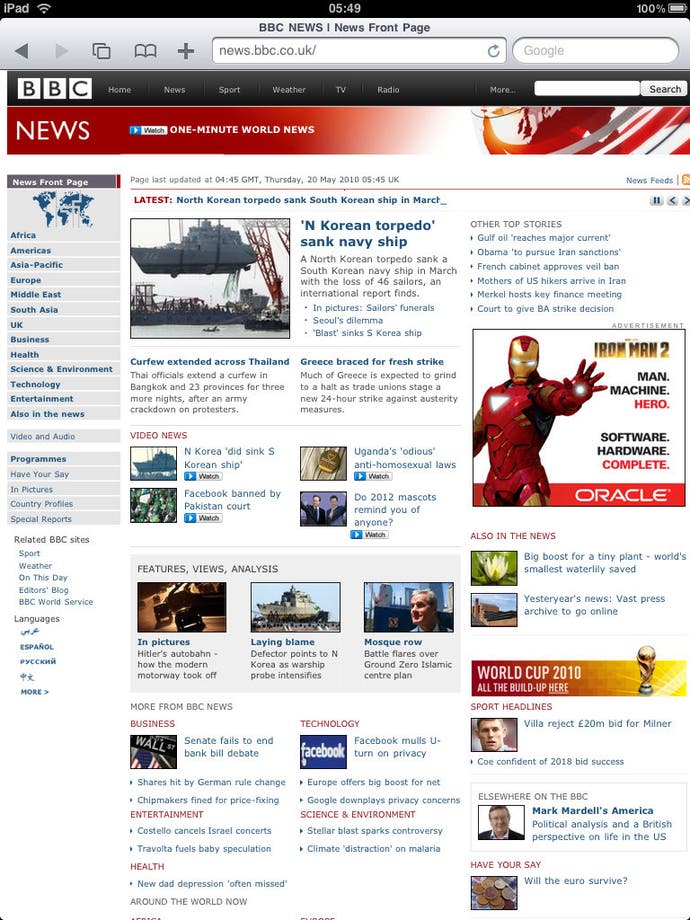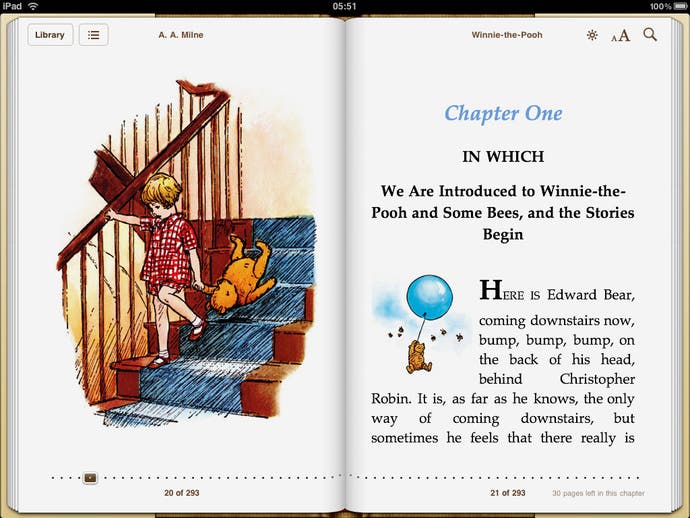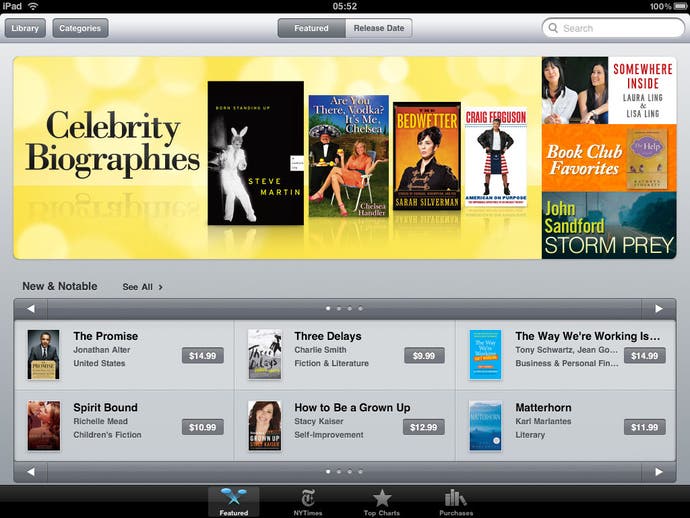Digital Foundry vs. iPad
The next big small thing dissected.
There's no doubt about it, Apple's iPad is a hugely polarising product. Some say it's the device the netbook should have been, an ultra-portable net browser and movie player, functionally rich and possessing phenomenal battery power. Others criticise it as little more than a mammoth, over-expensive iPod Touch, deliberately hobbled in several key technological aspects and prevented from full compatibility with a huge range of websites out there owing to Apple's dogmatic refusal to support Flash.
On the eve of the system's international launch, Digital Foundry decided to get hands on, and after a week of iPad ownership it is difficult to argue with either party. As a piece of hardware it is undoubtedly expensive for what it is, and as a paying customer I expect the browser to be fully functional, and not deliberately hobbled because Steve Jobs doesn't like Adobe.
However, these are pretty much the only criticisms I can level at the device: it seems to be the case that most of the negativity levelled at the iPad is made without checking out what it is designed to offer, and that experience definitely surpasses expectations.
The iPad is about much more than just the spec. First of all there's the make-up and form factor of the device itself. It feels a touch heavy, but it has that customary Apple build quality and thus the sense that it's very much a premium product.
The 9.7" LCD screen itself feels as though it's just the right size for browsing (aided by the fact that both portrait and landscape screen orientation are supported) and screen quality itself is beautiful with superb constrast levels and minimal backlight bleed. The overall size and heft of the device is clearly a step beyond the average netbook, weighing in at just shy of 700 grams.


Key to the iPad's charm is obviously the user interface. iPhoneOS migrates beautifully to the larger screen and arguably the most frustrating aspects of the system are overcome simply by having more real estate.
Liberated from the lack of pixels, Safari works that much better - just as well as a desktop browser, you could say. Indeed it's superior in some respects as touch simply feels more intuitive and faster than keyboard and mouse. The lack of Flash only proves annoying when embedded movies are completely absent from the page.
The sheer speed of Safari is also worthy of praise. Up against a 2.6GHz Core 2 laptop running Safari from a performance SSD, the iPad compares favourably and the browser feels faster and smoother than what you would expect from the average netbook. Similarly the default iPhoneOS email client works beautifully. It's hardly Thunderbird or Outlook but fast, stripped-down and to the point is what you'd want from a mobile internet tablet.


Convenience is another key factor in the iPad's appeal. Fancy dashing off a quick email, or checking your Facebook status? iPad gets you to where you want to be within seconds of pressing the power button.
Not only that but the stories about the device's prolific battery life are all true. You can easily get the requisite 10 hours of life from the onboard battery, and the lifespan of the charge seems to hold up whether you're playing games, browsing or watching movies. All of these aspects combine to make the iPad feel like a unique piece of technology.
Some semblance of Office-style applications are available in the form of Apple's own Pages, Keynote and Numbers tools. We won't go into depth on these, but they're easy to get to grips with and online help is only a couple of touches away.
The ability to perform Office-based tasks on the move is obviously welcome, and the sense is that the packages here are fully formed and will produce worthwhile results. However, importing and exporting documents via a convoluted hook-up with iTunes or the iWork website is hardly user-friendly and many will not be pleased that it's effectively impossible to print out your work from the device itself, necessitating more importing and exporting.
Perhaps more directly, there's a sense that the touch-screen keyboard isn't all it could have been. While accomplished typists should be able to get to grips with it quickly, there's no instant access to quotation marks or the apostrophe, which means that you're effectively beholden to the auto-correct to insert them for you if you're looking to produce work at a consistently reasonable speed.
The alternative is to switch to the sub-keyboard to get access to them, along with your numbers too. It's all the more bizarre in that the exclamation mark is instantly available on the main keyboard. The overall typing experience is not great, but certainly serviceable enough for emailing or the odd, swift blog post.
Moving back to the areas where the iPad is more competent, Apple's tablet has obviously been designed to take on Amazon's Kindle and Sony's E-Reader. Interestingly, the iPad doesn't ship with its iBooks functionality built in, it's a free download from the App Store.
The iBooks app slots into the user interface just fine, and performs exactly as you would expect it to. Navigating through your bookshelf and the store is easy, there's full support for both both portrait and landscape reading, fonts can easily be managed to give you the size and look you want from any book.


The American iBooks store seems to offer prices that are reasonable, if not spectacular, when compared to buying the physical copy from a shop like Amazon: some books are more expensive, others a touch cheaper.
Prices for digital copies range from 10 to 15 dollars, and browsable samples are easily downloaded. The thinking here seems to be that the convenience of downloading books and not being weighed down by them on your travels more than makes up for the fact you are effectively buying data, as opposed to a physical, collectible item.
Whether you go for that line of thinking is up to you, but one noteworthy aspect of the store is that there is a range of classics available to download for free. Not only does this give you instant, free access to some brilliant books, but it also allows you to test the iBooks app to see if the basic notion works for you as an alternative to buying the traditional hardback or paperback copy.

